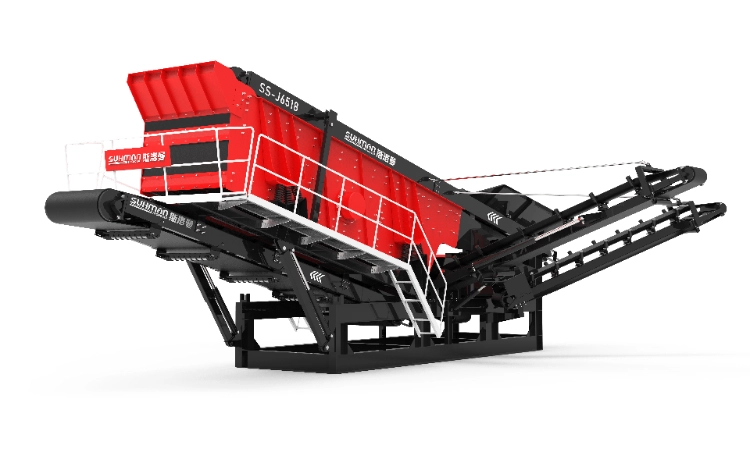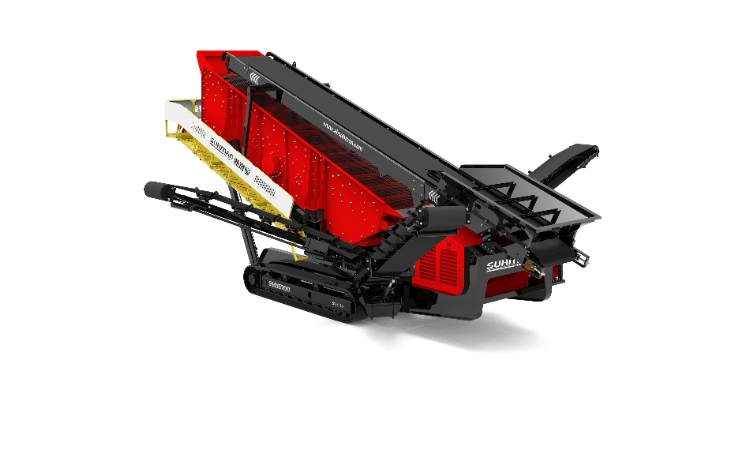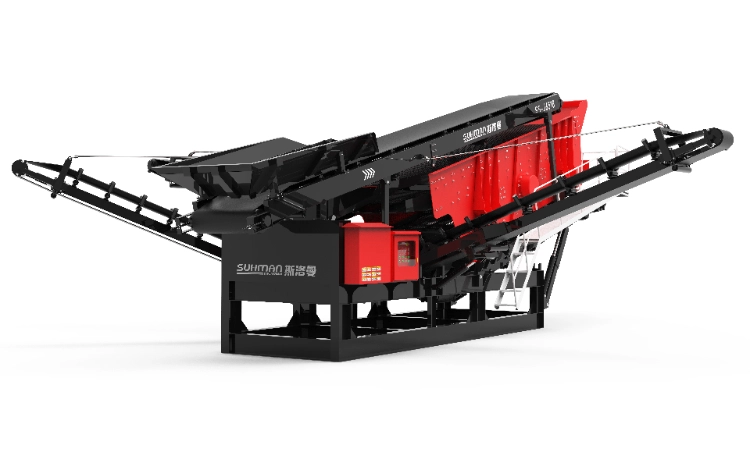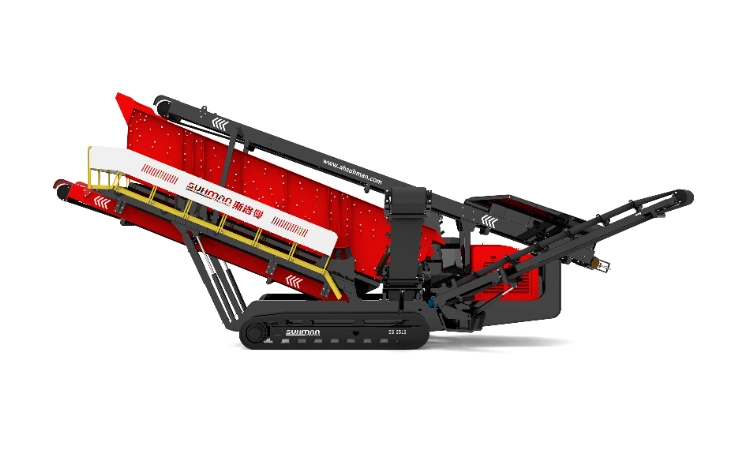Mobile Screening Plants
Release time: 2025-03-23
A Mobile Screening Plant is a sophisticated piece of equipment designed to separate materials like aggregates, minerals, soil, and recycled products into distinct fractions based on size, shape, or composition. Leveraging advanced screening technologies—such as vibrating screens, trommel screens, or scalping screens—and intelligent control systems, these plants deliver rapid and accurate material classification. Their mobility, typically facilitated by crawler tracks, allows deployment across diverse terrains and project sites, from remote quarries to urban construction zones.

Understanding Mobile Screening Plants
Mobile Screening Plants are engineered to process raw materials by separating them into usable fractions, a critical step in producing high-quality end products. Unlike stationary screening systems, which require fixed infrastructure, these plants are mounted on mobile platforms—typically crawler tracks or wheels—allowing them to be transported and set up quickly at various locations. This portability makes them ideal for projects with temporary or shifting operational needs.
The core function of a Mobile Screening Plant is to screen materials efficiently. Raw inputs, such as crushed stone or excavated soil, are fed into the plant via a hopper or feeder. These materials then pass through screening decks—equipped with meshes or perforated plates of varying sizes—that separate them into different categories. The screened fractions are discharged via conveyor belts into stockpiles or directed to additional processing equipment. This process ensures that materials meet specific size and quality standards for their intended use.
Key features include a robust chassis for durability, a high-capacity screening unit, and integrated conveyors for material handling. Advanced models incorporate control systems that allow operators to monitor performance and adjust settings in real time, optimizing efficiency and safety. For a detailed look at integrated solutions, see the Mobile Crushing and Screening Integrated Machine page, which showcases combined crushing and screening capabilities.
The Role of Mobile Screening Plants in Industry
Mobile Screening Plants play a vital role in addressing operational challenges across diverse industries. Their ability to process materials on-site reduces reliance on external facilities, cutting transportation costs and time delays. This is particularly valuable in remote or rugged environments where access to stationary plants is impractical.
In mining operations, these plants classify ores immediately after extraction, minimizing the need for large stockpiles and enabling faster material handling. Quarrying benefits from their capacity to produce aggregates like sand, gravel, and crushed stone at the point of extraction, adapting to the quarry’s progression. In construction, they transform demolition debris—such as concrete and asphalt—into reusable materials, aligning with sustainability goals and reducing landfill waste.
Their portability is a game-changer for projects with dynamic requirements, such as road construction or temporary worksites. By deploying screening plants directly where materials are needed, operators avoid the inefficiencies of fixed setups. Additionally, on-site processing lowers the carbon footprint associated with material transport, making these plants an environmentally responsible choice.
Types of Mobile Screening Plants
Mobile Screening Plants come in various configurations, each suited to specific materials and applications. The type of screening technology defines their functionality, with three primary categories standing out: vibrating screen plants, trommel screen plants, and scalper screen plants.
Vibrating Screen Plants
Vibrating screen plants use high-frequency vibrations to separate materials based on size. They feature multiple screening decks with different mesh sizes, enabling simultaneous classification into several fractions.
- Applications: Ideal for mining, quarrying, and recycling, these plants handle materials like sand, gravel, coal, and crushed aggregates.
- Advantages: High throughput, versatility across material types, and the ability to produce multiple product sizes in one pass.
For more on screening precision, visit the What is a Scalper Screen page, which explores related technologies.
Trommel Screen Plants
Trommel screen plants employ a rotating cylindrical drum with perforated screens. As the drum turns, materials are lifted and dropped, allowing smaller particles to pass through while larger ones exit at the end.
- Applications: Suited for composting, waste management, and mining, especially with wet or sticky materials like organic waste or alluvial deposits.
- Advantages: Gentle material handling, effective for moist substances, and minimal maintenance needs.
Scalper Screen Plants
Scalper screen plants are built for heavy-duty pre-screening, removing oversized materials or fines before further processing. They feature robust screens designed for high-volume, coarse material separation.
- Applications: Essential in quarrying and mining for handling raw feeds with significant fines or oversized rocks.
- Advantages: Boosts downstream equipment efficiency, reduces crusher wear, and enhances productivity.
Learn more about heavy-duty options on the Scalper Heavy-Duty Screening Machine page.
Key Components of Mobile Screening Plants
A Mobile Screening Plant integrates several components that work together to ensure reliable performance:
- Chassis and Tracks: Provides structural integrity and mobility, with tracks excelling in rough terrain.
- Screening Unit: The heart of the plant, available in various forms (vibrating, trommel, or scalper), tailored to specific needs.
- Feeder: Controls material input, often with pre-screening to remove fines and prevent overloads.
- Conveyor Belts: Moves materials through the system, from feed to discharge, with separate belts for each fraction.
- Control System: Offers real-time monitoring and adjustments for optimized operation.
- Power Unit: Typically diesel or electric, with hybrid options for efficiency and lower emissions.
For insights into modular designs, check the Efficient Crushing Screening Equipment page.
Operational Workflow of Mobile Screening Plants
The operation of a Mobile Screening Plant follows a streamlined process:
- Material Loading: Raw materials are fed into the hopper using loaders or excavators.
- Screening: Materials pass through decks, separating into fractions based on size or type.
- Discharge: Conveyors transport screened products to stockpiles or further processing.
- Monitoring: Operators adjust settings via the control system for consistent performance.
This workflow ensures high efficiency and adaptability. For selection tips, see the How to Choose the Right Crushing and Screening Equipment page.





Applications Across Industries
Mobile Screening Plants serve a broad range of applications:
- Mining: On-site ore classification reduces logistics costs.
- Quarrying: Produces aggregates near extraction points.
- Construction: Recycles waste into usable materials.
- Road Building: Supplies aggregates for remote projects.
Benefits of Mobile Screening Plants
The advantages of these plants are significant:
- Mobility: Quick setup and relocation save time.
- Cost Efficiency: Reduces transport and operational expenses.
- Sustainability: Minimizes environmental impact through on-site processing and recycling.
For a comparison with other equipment, visit the Mobile Crushing Plant vs. Mobile Screening Plant page.
Choosing the Right Mobile Screening Plant
Selecting the appropriate plant involves evaluating:
- Capacity: Match throughput to project scale (e.g., tons per hour).
- Material Type: Consider particle size, moisture, and abrasiveness.
- Site Conditions: Assess terrain and space constraints.
- Customization: Options like screen size or hybrid power.
Future Trends in Mobile Screening Technology
Innovations are shaping the future of these plants:
- Automation: AI and IoT for predictive maintenance and efficiency.
- Eco-Friendly Design: Hybrid and electric power options.
- Integration: Combining with crushing units for all-in-one solutions.
This exploration of Mobile Screening Plants highlights their transformative role in material processing, offering practical insights for optimizing operations across industries.


